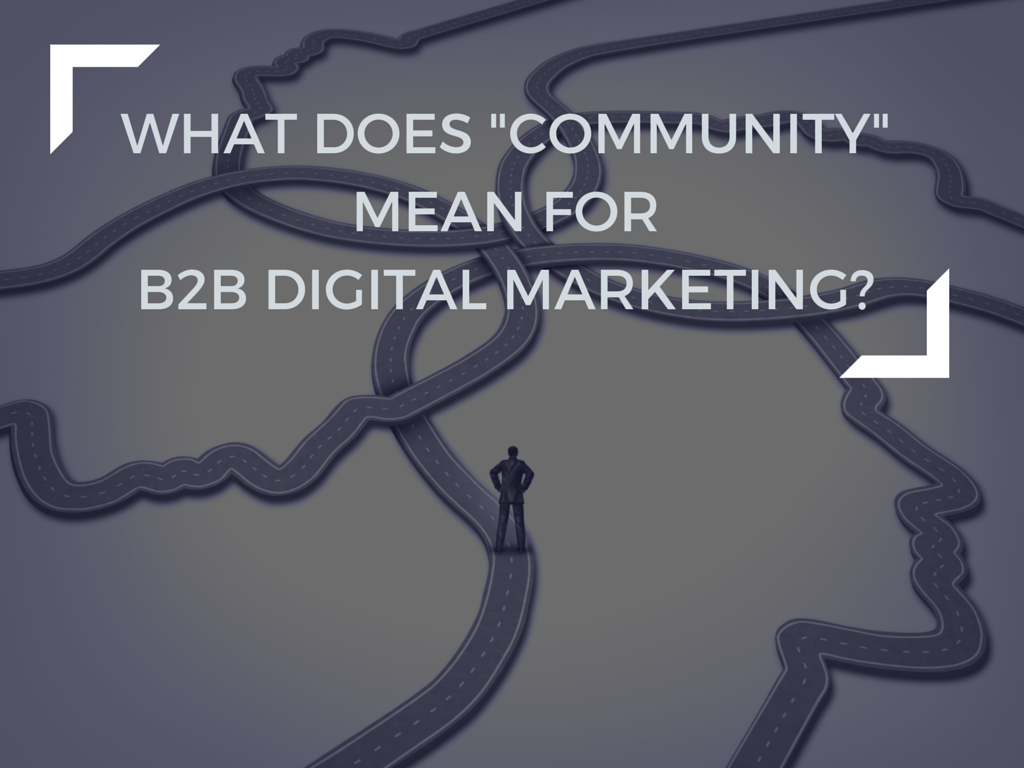B2B businesses often approach social media marketing with an attitude that “bigger is better.” They eagerly believe that the more followers, the better. The more likes, the better. The more tweets at more times in the day, the better.
However, effective B2B digital marketing is not a clear-cut numbers game. In fact, smaller numbers are sometimes better (so long as they convert) because that means you’re targeting the right attention for your blog and social media. Why? The reason that smaller is better comes down to a hot digital marketing topic for social 2015: community.
What Is Community?
The standard definition of a community is a group of people with similar backgrounds and goals. In digital marketing, however, community refers to the small but potent group of fans and peers that make up your client base and B2B business network. Infamous marketing thinker Seth Godin refers to this kind of community as a tribe, or a group of people who connect with each other because they share an idea and a leader.
Successful B2B digital marketing doesn’t strive to add zeroes to your follower counts. Instead, its goal is to attract and engage your tribe -- the people who are actually paying attention and actively seeking information. And if you do it right, you might find yourself adding zeroes to your follower counts anyway… except this time these followers will represent targeted prospective customers rather than empty seats.
The Social Media Marketing Podcast recently interviewed Jared Easley, co-founder of the industry-leading podcasting conference Podcast Movement, about creating a community. In the interview, Jared talked about how he used Facebook to build a community of followers who eventually funded his $11,000 Kickstarter campaign. This may not be the best way to raise money for your B2B business, but it does go to show the power of uniting your tribe to achieve a specific goal.
How to Identify Your Community
Building your community starts with understanding who makes up your community. Take a look at your customers and the customers of your competitors. Where do they spend their time online? When you’ve identified these demographics, it’s a simple matter of researching their social usage by income, age and gender, or medium preference. Armed with the knowledge of where people spend time online, you can target people who are most likely to be a good fit for your community.
Another great way to build your community is to use your personal network and your established customers. When you speak to them in person or by phone, ask them where they spend time online. Carefully monitor which links they share on their LinkedIn profiles. Keep a list of brands, publications, and sites they mention to paint a comprehensive picture of how your tribe prefers to spend time online.
How to Connect With Your Community
As the members of your community start to become more obvious, connect with them strategically. Arsen Rabinovich of TopHatRank shares a few pro steps in connecting with your audience on Facebook, LinkedIn, and Twitter in his SEMrush blog post “Build Social Communities: Real World Strategies for SMBs.” Some of these strategies may entail a large initial time investment, but building your community will pay off in the long term.
Then consider your customer’s day-to-day life and technology usage. How many tweets or LinkedIn posts will they see and engage with in a meaningful way? How much content do they want from you? How much content is too much for them? Make note of the best times to post and plan your B2B digital marketing strategy accordingly.
In B2B digital marketing, quality trumps quantity. Even a modest social media following can help you reach your sales goals if they represent a dedicated, engaged population. Find your community first, then guide your digital marketing efforts according to what they need.







